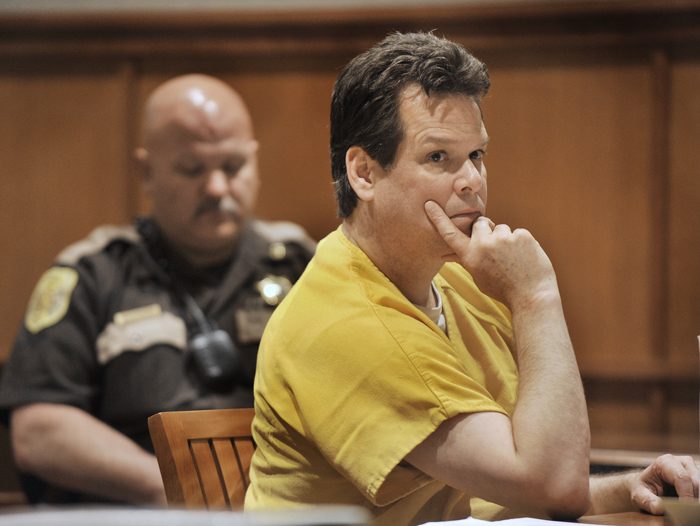ROCKLAND — Dennis Dechaine was sentenced today to three months of imprisonment for misdemeanor drug possession in connection with a 2010 overdose at the Maine State Prison.
Dechaine was scheduled to go on trial for the felony offense of trafficking in prison contraband today in Knox County Superior Court. His lawyer said he brought up the possibility of a plea arrangement that morning.
The sentence imposed by Justice William Broderick was less than the prosecutor sought and not the suspended sentence request by the defense. The difference may be academic because Dechaine is serving a life sentence for the 1988 kidnapping and murder of 12-year-old Sarah Cherry of Bowdoin.
The three-month sentence interrupts Dechaine’s life sentence. He was also fined $400.
Dechaine, 54, is in the midst of seeking a new trial based on DNA evidence from a portion of thumbnail clipped from the girl during the autopsy. His four previous appeals have failed.
The drug charge stems from an April 5, 2010 incident in which Dechaine was found unconscious, with a very low pulse rate and blood pressure, in his cell at the state prison in Warren. He was taken by helicopter to a Portland hospital and returned to the prison two weeks later.
Dechaine told a reporter that summer that he had used morphine and Klonopin, a drug used to treat seizures and panic disorders, in a suicide attempt.
Under the plea agreement, the felony charge was dismissed and Dechaine pleaded no contest to unlawful possession of morphine. The plea was open, meaning that Broderick could impose any allowable sentence for the offense. The maximum penalty was one year.
District Attorney Geoffrey Rushlau had asked for a sentence of six months and noted that prisoners are prohibited from possessing drugs, which in addition to being dangerous can serve as a type of currency among inmates.
Defense attorney Steve Peterson asked for a suspended sentence, saying that it was absurd to add jail time to a life sentence for a suicide attempt.
Rushlau characterized the incident as recreational drug use gone wrong and said no suicide note was found in Dechaine’s cell. The prosecutor said Dechaine had said at the time that the overdose was an accident but later told people he tried to kill himself.
“What we’re trying to do is treat him essentially the same as we would anybody else in a similar situation. And I think this is accomplishing that,” Rushlau said of the outcome after the proceeding.
Dechaine had overdosed in a separate incident seven years ago, Rushlau said. In that incident, Dechaine insisted it was an accident, Rushlau said.
That matter was not investigated criminally, but in the case of the 2010 overdose, blood and urine drawn as part of his treatment indicated the presence of morphine, Rushlau said.
Peterson said in court that if the case had gone to trial, the medical records would have been replete with evidence that Dechaine had tried to kill himself. Peterson also noted that Dechaine was on suicide watch when he returned to the prison.
Peterson later said the jury would have had to struggle with the evidence about drug use and the context in which it took place.
“The fact that he’s in jail for life for something he professes he doesn’t do – you can also understand why someone would want to kill himself,” he said.
In a July 10, 2010 letter to a reporter for The Portland Press Herald/Maine Sunday Telegram, Dechaine said he ingested a combination of prescription drugs in a suicide attempt.
“I have been imprisoned 22 years and the soul crushing monotony, boredom, institutional food, pervasive violence, 24 hour lights, near constant noise, harsh treatment, myriad petty rules, lack of resources, loss of potential, separation from my family and friends, along with a raft of other negativity, simple conspired to erode my will to live,” Dechaine wrote to then-reporter Trevor Maxwell.
Staff writer Ann S. Kim can be reached at 791-6383 or at akim@pressherald.com
Twitter: AnnKimPPH
Send questions/comments to the editors.



Comments are no longer available on this story